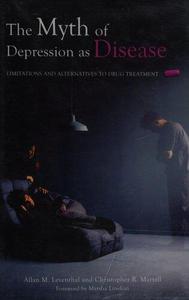The myth of depression as disease limitations and alternatives to drug treatment

The myth of depression as disease: limitations and alternatives to drug treatment By Allan Leventhal, Christophe Martell
2005 | 200 Pages | ISBN: 0275989763 | EPUB | 1 MB
Depression is commonly thought of as a biological disorder best treated with antidepressant medications. Pharmaceutical companies and many experts promote this view as established in scientific fact. Here, Leventhal and Martell argue that there is scant actual scientific evidence for this view, and that the issue is open to considerable question. They maintain that there is very little known―they call the evidence woefully weak―regarding the role of biology in depression. Marketing by drug producers has not only led the public to accept dubious claims and over-value antidepressants, but has also led medical doctors to prescribe them excessively. Leventhal and Martell argue that the effectiveness of psychological therapy has strong scientific support in the treatment of anxiety and depression, and it is safer and results in less frequent relapse. This book will help consumers decide which treatment is best for them. It includes a list of questions to ask before accepting a prescription for antidepressant medication.Readers will find this book helpful in understanding the controversy surrounding the widespread prescription and use of antidepressants. It traces the history and science behind the pharmaceutical treatment of depression, and it presents, in accessible language, information that will empower readers to make the best choices possible regarding the treatment of their own or their loved ones' feelings of depression and anxiety. The audience for this book includes those who are depressed and considering professional help, those concerned about health care and the services offered in the mental health field, and doctors or mental health professionals who may wish to reconsider the basis for treatments they are recommending to patients. Students and scholars in psychology, clinical psychology, public health, social work, and psychiatry will also find this of interest.


![S.T.A.L.K.E.R. 2 / STALKER 2: Heart of Chornobyl - Ultimate Edition (2024) [+UPDATE 23.12.2024 - v1.1.3] ElAmigos / Polska wersja językowa](https://i.postimg.cc/Zqd8RWGY/UZG8PBE.jpg)



















































![David Gilmour - Luck and Strange (2024) [FLAC]](https://i.imgur.com/everaBc.jpeg)
![Męskie Granie Orkiestra - Męskie Granie 2024 (2024) [FLAC]](https://i.imgur.com/FAyOxrM.jpeg)
![The Rolling Stones - Hackney Diamonds (2023) [FLAC]](https://i.imgur.com/wCkyyUN.jpg)
![Lady Gaga - Harlequin (2024) [FLAC]](https://i.imgur.com/dcgIA8D.jpeg)
![Natalia Kukulska - Dobrostan (2024) [FLAC]](https://i.imgur.com/bdljG3O.jpeg)
![Kaśka Sochacka - Ta druga (2024) [FLAC]](https://i.imgur.com/hORQKvn.jpeg)
![Kuba Sienkiewicz - Pani Bóg (2024) [FLAC]](https://i.imgur.com/qijCx8Z.jpeg)
![Lanberry - Heca (2024) [FLAC]](https://i.imgur.com/8P7QfeR.jpeg)
![Sara James - PLAYHOUSE (2024) [FLAC]](https://i.imgur.com/m4f8OKg.jpeg)
![Grzegorz Hyży - EPILOG (2024) [FLAC]](https://i.imgur.com/8DA2sBr.jpeg)
![Myslovitz - WIECZORAMI CHŁOPCY WYCHODZĄ NA ULICE (2024) [FLAC]](https://i.imgur.com/l9mMtIG.jpeg)
![Krzysztof Zalewski - ZGŁOWY (2024) [FLAC]](https://i.imgur.com/vh48RAc.jpeg)
![Krzysztof Cugowski - Wiek to tylko liczba (2024) [FLAC]](https://i.imgur.com/SBzgqe2.jpeg)
![Nosowska - Kasia i Błażej (2024) [FLAC]](https://i.imgur.com/mObvVXQ.jpeg)
![sanah - Pianinkowe Kaprysy (2024) [FLAC]](https://i.imgur.com/pVjjPAa.jpeg)
![Kwiat Jabłoni - Pokaz slajdów (2023) [FLAC]](https://i.imgur.com/diERHfZ.jpg)
![Robert Cichy - Spacer po Warszawie (2024) [FLAC]](https://i.imgur.com/ixleU9o.jpeg)
![Viki Gabor - Terminal 3 (2024) [FLAC]](https://i.imgur.com/Q1KCnDs.jpeg)
![Sanah - Kaprysy (2024) [FLAC]](https://i.imgur.com/71OZm4h.jpeg)
![Męskie Granie Orkiestra - Męskie Granie 2023 (2023) [FLAC]](https://i.imgur.com/U4YHo8d.jpg)




